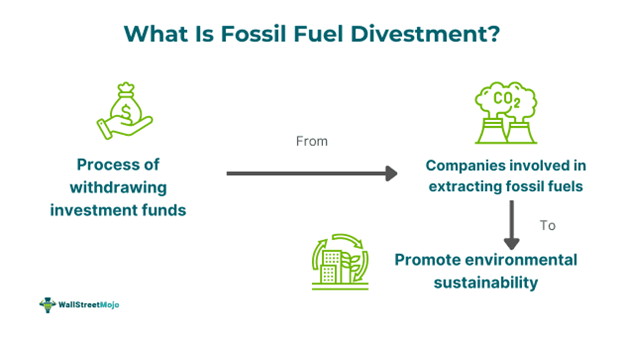Table of Contents
What Is Fossil Fuel Divestment?
Fossil fuel divestment is the practice of withdrawing capital from businesses involved in the extraction and production of fossil fuels. This act aligns with sustainable environmental goals and demonstrates a commitment to reducing carbon emissions and combating climate change. It contrasts with investment, which typically supports the growth and expansion of a business.

The withdrawal of capital can create financial constraints on the fossil fuel sector, potentially reducing company operations and limiting shareholder returns. These measures can make fossil fuel companies less attractive investments due to the anticipated lower returns and higher risks. It is considered a positive step towards environmental conservation and protection.
Key Takeaways
- Fossil fuel divestment is a strategic approach that involves withdrawing funds from companies that rely on fossil fuels.
- The goal of this strategy is to reduce the financial resources of these companies, thereby limiting their operations.
- This is viewed as a positive step towards environmental protection and encourages both the public and the government to address the climate crisis.
- This strategy's advantages include reducing carbon footprints and creating opportunities for alternative, environmentally positive investments.
- However, it also has disadvantages, such as the limited impact individual investors can make and the challenges in finding and maintaining alternative energy sources.
Fossil Fuel Divestment Explained
Fossil fuel divestment is a strategy of withdrawing investment from companies involved in the fossil fuel sector. This move is intended to drive positive social change, promote environmental conservation, and influence public and policy preferences. Supporters believe that financially weakening fossil fuel companies will help combat the climate crisis.
Divestment is a movement to limit the financial resources available to companies that rely on fossil fuels. Financial support for these companies often sustains business models that are harmful to the environment, leading to the loss of vegetation and wildlife and contributing to climate change. Critics argue that fossil fuel companies sometimes use their funds and influence to downplay environmental damage, mislead the public, and resist regulatory measures.
The goal of fossil fuel divestment is to pressure these companies to change their operations, adopt sustainable methods, or potentially run them out of business. Additionally, divestment aims to raise public awareness and encourage sustainable practices. It also seeks to compel governments to implement policy changes and redirect research efforts toward mitigating existing environmental damage and preventing future harm.
Examples
Let us look at some examples to understand the concept.
Example #1
Imagine ABC Ltd, a cloth manufacturing company. Recently, it became aware that the demand for winter wear has decreased near its headquarters over the years. The company understands that this may be due to the increasing heat in the locality, which is attributed to climate change. Realizing its potential to make a positive impact as a large company with many branches, ABC Ltd decided to divest from companies that use fossil fuels and start a fossil fuel divestment movement in the locality.
The company prepared a fossil fuel divestment list and severed financial ties with these companies. Instead, they redirected their investments to manufacturing companies that produce solar panels. This not only helps tap into potential energy sources but also reduces the company's carbon footprint. Additionally, they publicized the fossil fuel divestment list to encourage others in the community to make more environmentally conscious choices.
Example #2
The climate crisis is a global problem, and countries worldwide are taking action, each facing their own challenges and developing unique solutions. In the Philippines, the Clean Energy think tank Center for Energy, Ecology, and Development (CEED) launched the 2024 Fossil Fuel Divestment Scorecard. The scorecard highlights the adverse effects of funding fossil fuels on environmental conservation.
The Philippines is a signatory to the pledge to triple worldwide renewable energy capacity. The report revealed that from 2009 to 2023, financing for fossil fuels was twice that of renewables. However, in 2023, renewable energy financing was three times the amount of fossil fuels for that year. The scorecard also ranked the top banks in terms of divestment efforts: Asia United Bank (AUB), China Bank, Bank of the Philippine Islands (BPI), and Banco de Oro (BDO). While these banks have made significant strides in renewable energy financing, they also remain substantial funders of coal and fossil gas.
Pros And Cons
Given below are some of the pros and cons of the strategy
Pros
- Reduction in carbon footprint: The main objective of fossil fuel sector divestment is to reduce the carbon footprint, which relates to the amount of greenhouse gases added to the atmosphere. Discouraging investments aims to reduce their operations and thus the carbon footprint.
- Better alternative investment opportunities: Divestment in one sector can introduce investment opportunities in another, such as renewable energy. This shift can increase demand for clean energy technologies.
- Positive image for investors: When investors withdraw their funding from fossil fuels, it shows their commitment to a cleaner future and concern for the environment. This ethical stance can attract new customers and retain existing ones.
- Policy framework: Divestment activities attract public attention, pressuring governments to implement policies that restrict fossil fuel use and promote investment in alternative energy sources, facilitating action on climate issues.
Cons
- Investor population issues: Not all investors prioritize the environment, and those who do may be too few to influence markets significantly.
- Only the small ones suffer: Fund retraction through divestment can mainly impact small companies, while larger companies may continue operating without external funding.
- No effect on cash flows: Divestment may impact available funds, but it may not significantly affect cash flows unless redirected to new share offerings in alternative investments.
- Challenges in finding alternative investments: Identifying and maintaining new energy sources can be challenging, and the adoption of alternatives may take time, potentially negatively impacting economic growth.
